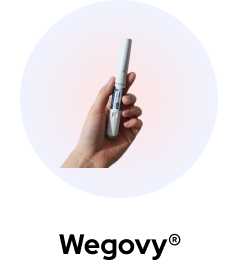While Ozempic is intended for the treatment of type 2 diabetes, studies have shown that it can also be highly effective when it comes to weight management. Currently in Canada, it’s approved for those who either have type 2 diabetes or a BMI over 27.
But what do the reviews say? Is it as effective as people claim in helping to manage long-term weight loss? And what do you need to consider before talking to your medical team about starting Ozempic?
In this article we’ll cover the basics, including:
- What Ozempic is
- What taking Ozempic feels like
- Ozempic reviews from Redditors
- How long it can take to lose weight on Ozempic
- Ozempic side effects to be aware of
- Where in Canada you can get hold of Ozempic
- Frequently asked questions.
Let’s get started with all things Ozempic!
What Is Ozempic?
Ozempic is an injectable drug designed for blood sugar level management in adult type 2 diabetics. Not only can it work to improve your body’s sugar levels and lower your A1C, it can also help reduce the risk of major cardiovascular events in patients. This includes stroke, heart attack, and death.
While Ozempic is the brand name you may be familiar with (marketed by Novo Nordisk), you may see it marketed as Wegovy or Rybelsus. These are all formulations of semaglutide, which is a glucagon-like peptide-1 (GLP-1) agonist. Semaglutide works in the body to stimulate insulin production, which in turn lowers blood sugar.
Research has shown that a side effect of semaglutide is that it can suppress hunger, which is why it’s often used as an effective weight-control medicine in those struggling with obesity. It can be prescribed to patients with a BMI over 27 to help control their body weight, in conjunction with healthy diet, exercise, and therapy.
When it comes to insulin resistance, Ozempic actually improves insulin sensitivity, making it a great choice for those with type 2 diabetes.
How to Take Semaglutide
Semaglutide comes in the form of once a week injections. These are administered via an Ozempic Pen, much like an EpiPen, subcutaneously (ie, into the fatty tissue, just beneath the skin).
Your dosage of Ozempic will vary per person, but can come in 0.25mg, 0.5mg, 1mg, or 2mg doses.
Novo Nordisk has full instructions on how to use your Ozempic Pen, including a helpful video, but if you’re unsure, consult your medical team or physician. As it’s a prescription drug, you’ll need to consult with your medical team before beginning it.
Once you’ve discussed use with your medical team, they’ll also help you to come up with a treatment plan, including dosage strength and treatment time period.
What is Ozempic for Weight Loss?
As mentioned, Ozempic can be highly effective for long-term weight management, thanks to its side effects of appetite suppression and increased satiety (a feeling of fullness).
However, not anyone can take Ozempic for its potential weight loss side effects. Suitable candidates will need to have a BMI of 27 or higher in order to be prescribed Ozempic. It’s also recommended that you combine its use with a healthy diet, exercise, and — if necessary — therapy.
Regardless, you’ll need to consult your medical team before beginning Ozempic.
What Does Taking Ozempic Feel Like?
As with all medications, everyone will have a different experience when taking Ozempic.
However, commonly reported effects include:
- Lack of appetite and cravings – This can help with weight management, as it may lead to decreased size of portions, as well as elimination of certain foods from your diet
- Increased satiety after eating – This could also assist with weight management, as you’ll be more likely to feel full after meals, preventing snacking
- Nausea – This may inadvertently prevent you from wanting to eat anything, particularly food that is either high in sugar or fat
- Changes in energy levels – While some people have reported feeling fatigued while on Ozempic, others have reported the opposite: an increase in energy as they moved closer towards their weight goals and improved cardiovascular health.
This is not a complete list, and there are a lot of side effects and symptoms potential patients and prescribers should be aware of.
You should be particularly cautious if you’re taking any other prescribed drugs, as Ozempic can have a number of contraindications. Be sure to make a point to disclose this fully to your medical team.
Is Ozempic a Type of Insulin?
Ozempic is not a type of insulin. Instead, the drug mimics naturally occuring incretin glucagon-like peptide-1 (GLP-1). GLP-1 is a hormone that stimulates insulin production.
So, while Ozempic is not insulin itself, it does lead to more insulin being produced in your body.
Is Ozempic a Type of Stimulant?
Ozempic is not a stimulant. Stimulants are drugs that act on the central nervous system, usually increasing heart rate and making you feel alert. For example, coffee and chocolate both contain the stimulant caffeine.
There are a variety of stimulant medications that are commonly prescribed for weight loss. However, as Ozempic acts on your insulin production system, not your nervous system, it is not classed as a stimulant.
Examples of Ozempic Reviews on Reddit
While everyone’s results on Ozempic will vary, many have reported positive results and benefits, including assistance with their weight management.
One user reported that they lost over 70 lbs in the span of 8 months, complete with impressive progress pics.
Another user with diabetes celebrated their BMI’s transition to “overweight” from “morbidly obese”, due to the blood glucose lowering properties of Ozempic.
Many other users also reported personal weight loss goals, and a reduction in their food cravings. This is likely due to the side effects people can experience when they begin Ozempic.
How Long Do Users Take to Lose Weight on Ozempic
Honest Ozempic Reviews
There’s no one timeframe for weight loss on Ozempic — it’s different for everybody. However, according to reviews, people generally begin to notice a change in their body after a few weeks on the drug.
Some people have reported a weight loss of around 75 lbs in a year, but this will be dependent on personal factors, such as diet, dose, and the individual.
Ozempic for Weight Loss in Non-Diabetics
Ozempic is not currently approved in Canada as a weight-loss drug for non-diabetics or those with a BMI under 27. Wanting to lose weight for cosmetic reasons is not a valid medical reason to take Ozempic.
Safe and Legal Alternative for Weight Loss
If you’re considering what other alternatives there are for weight management in your life, consult with your medical team about potential safe and legal options.
Generally speaking, if your BMI is under 27, a healthy diet and regular exercise is the recommended course of action. You should aim for around two pounds a week when it comes to weight management, as this is considered to be both safe and sustainable.
You may also want to consider therapy, as psychological factors may be preventing you from achieving your weight goals and successfully managing your weight.
What are Ozempic Side Effects?
Like any medication, Ozempic can have side effects.
Common side effects may include:
- Irritation of the skin – Redness, swelling, or itching at the injection sight
- Dizziness
- Fatigue
- Headaches
- An upset stomach – Including nausea, constipation, diarrhea, vomiting, gas, burping, bloating, or acid reflux
- Shortness of breath
- Changes in your sense of taste.
Serious side effects have also been reported at times, and may include:
- Hypoglycemia
- Severe stomach pain
- Changes in vision
- Pancreatitis
- Gallbladder issues
- Kidney issues
- Thyroid cancer
- Allergic reactions.
If you have any of the above serious side effects, stop your use of Ozempic immediately and contact your medical team, or go directly to the ER at your local hospital.
Where to Buy Ozempic in Canada?
In Canada, Ozempic is only available via prescription.
Your medical team, walk-in clinics, Nurse Practitioners, and telemedical companies can prescribe Ozempic.
Prescriptions can be picked up at pharmacies, either in person or through the mail.
You should be aware that the cost of Ozempic will not necessarily be covered by your insurance, unless prescribed for the treatment of type 2 diabetes.
Key Takeaways
Ozempic is a prescription medication that is only approved for the treatment of type 2 diabetes or to assist with weight management in those with a BMI over 27.
Many people have reported successfully being able to manage their weight by using Ozempic in conjunction with a healthy diet and exercise, but you’ll need to consult your medical team to see if it’s the right choice for you.
Ozempic Reviews FAQs
How much can I lose by taking Ozempic for a month?
How much weight you lose on Ozempic depends greatly on the person. However, an average loss of around one kg has been demonstrated clinically.
Generally speaking, when it comes to weight management, you should aim for a loss of around two pounds a week, as this is considered both safe and sustainable.
Too much weight loss too quickly could lead to serious health issues, as well as the appearance of loose and sagging skin.
Is it worth taking Ozempic for weight loss?
Many people have successfully been able to manage their weight through use of Ozempic when combined with a healthy diet and exercise. However, Ozempic is currently only approved for use in the treatment of type 2 diabetes, or for those with a BMI over 27.
Talk to your medical team to decide if Ozempic, or another semaglutide medication, will work for your individual goals.
How quickly does Ozempic work for weight loss?
Everyone is different in regards to their rate of weight loss. However, most Ozempic users tend to report that they start to lose weight within a few weeks of starting the medication.
You should monitor your weight management carefully with your medical team, to ensure that any loss is achieved safely and sustainably.
How does Ozempic work?
Designed for blood sugar level management in adult type 2 diabetics. Not only can it work to improve your body’s sugar levels and lower your A1C, it can also help reduce the risk of major cardiovascular events in patients. This includes stroke, heart attack, and death. It is a glucagon-like peptide-1 (GLP-1) agonist. Semaglutide works in the body to stimulate insulin production, which in turn lowers blood sugar.
Research has shown that a side effect of semaglutide is that it can suppress hunger, which is why it’s often used as an effective weight-control medicine in those struggling with obesity. It can be prescribed to patients with a BMI over 27 to help control their body weight, in conjunction with healthy diet, exercise, and therapy.
When it comes to insulin resistance, Ozempic actually improves insulin sensitivity, making it a great choice for those with type 2 diabetes.
Is Ozempic Helpful for Weight Loss?
As mentioned, Ozempic can be highly effective for long-term weight management, thanks to its side effects of appetite suppression and increased satiety (a feeling of fullness).
However, not anyone can take Ozempic for its potential weight loss side effects. Suitable candidates will need to have a BMI of 27 or higher in order to be prescribed Ozempic. It’s also recommended that you combine its use with a healthy diet, exercise, and — if necessary — therapy.
Regardless, you’ll need to consult your medical team before beginning Ozempic.












 (US)
(US)